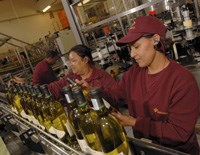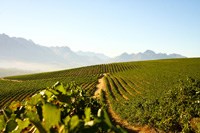
Top stories





Marketing & MediaAds are coming to AI. Does that really have to be such a bad thing?
Ilayaraja Subramanian 20 hours

More news















Earnings were impacted, however, by a once-off extraordinary excise duty provision amounting to R297.8m, because of a reclassification of wine aperitifs by the South African Revenue Service (SARS). On a normalised basis, headline earnings rose by 23.1%, but, on a reported basis, headline earnings rose by 0.8%.

Referring to the increased sales volumes in all product categories, Distell Group MD, Jan Scannell, explained that RTDs and ciders, in particular, performed exceptionally well. A suite of strong brands across the portfolio also meant revenue growth could be achieved without sacrificing margins. Gross margin (restated) improved to 34.7% from 32.7% a year ago.
He confirmed that the company was on track in its goal to increase the year-on-year contribution of export sales to revenue. Revenue derived outside South Africa, on a non-duty- paid basis, comprised 27.5% of the total, up from last year's 26.4%.
In the domestic market, Distell had outpaced the rate of growth achieved in the national retail alcoholic beverage sector for the reporting period, he said. Whereas AC Nielsen data had shown a 3.0% increase in sales volumes and 8.2% in value, the company had grown local sales volumes by 9.6%, while revenue had risen 13.8% to R1.6bn.
Once again, its ciders, Hunter's in particular, and its ready-to-drink (RTD) brands were the star performers, reflecting double-digit growth. The newer ready-to-serve (RTS) Mainstay offerings also produced excellent sales.
Strong growth within the company's spirits division came from brand leader Amarula, off an already well-established base, as well as from cognac brand Bisquit, and the Three Ships whisky range. All three brands achieved double-digit growth. However, the impact of these gains was muted by the weaker performance of the brandy category.
Wine sales growth had been slightly below the national average of 4.3%, but there had been some significant highlights, Scannell said. Nederburg, given additional visibility because of its participation as a sponsor in the debut MasterChef SA series earlier this year, had performed extremely well in the premium sector. Paarl Perlé and Autumn Harvest Crackling had also delivered excellent results in the popularly priced category. The company's sparkling wines had marginally outperformed the industry average, while fortified wines had shown exceptional growth in volume and value, led by Sedgwick's Old Brown.

International sales volumes increased by 10.7%, with revenue up 21.1% to R3.4bn. Sub-Saharan African markets, in particular, delivered another year of strong growth, contributing 60.8% to foreign revenue.
"What is most pleasing is that international volume growth was achieved across all important categories, with spirits and wine sales volumes growing by 13% and 6% respectively, while RTD volumes rose by 19%."
Bisquit's international volumes increased 5% and revenue by 33%, with exciting growth occurring in developing markets in the East, Eastern Europe and Latin America.
Although the company's wine sales were still very dependent on the developed markets of the UK and Western Europe, both of which had been severely affected by the economic downturn, volume growth of 6% and revenue growth of 15% were achieved. While wine sales growth occurred across all regions, the biggest increases came from Sub-Saharan Africa, South America and Asia.
Contrary to the view of some wine producers, the UK could still offer good growth. "Our investment in 2010 in Brand Phoenix is yielding good results. We are now far better represented in the retail channel than ever before and continue to unlock the potential in this market," adds Scannell.
RTD and cider exports also saw strong volume and revenue growth, mostly derived from Africa. Distell was now the world's second largest cider producer by volume.
A dividend of 152 cents (2011: 132 cents) per share has been declared. This represents a total dividend of 295 cents (2011: 256 cents) for the year and a dividend cover of 1,6 times (2011: 1,9 times) by headline earnings.
Capital expenditure amounted to R500.1m, of which R157.9m was spent on the replacement of assets. A further R342.2m was dedicated to the expansion of capacity, mainly at the company's cider and RTD production facilities.
Looking ahead, he said that while the prevailing uncertainty of the global macro-economic environment made it difficult to anticipate trends in demand, consumer spending was expected to remain modest both domestically and internationally.

"Nevertheless, the strength of our brands, our strong distribution networks and our enhanced routes to market should see us well placed to continue building on our achievements."
On a normalised basis, headline earnings were 23.1% up and operating profit 19.0% higher than in the previous year. However, allowing for the extraordinary item arising from the reclassification by SARS of wine aperitifs, headline earnings rose 0.8% to R969.9m, while operating profit declined 1.7% to R1.41bn.
Wine aperitifs, launched almost 40 years ago, are produced by adding flavourants, water and distilled spirit to a deflavoured wine base. The final alcohol content of these products varies between 18% and 23% by volume (ABV). In the past, wine and fermented beverages, with a 23% ABV or below, were classified as fermented products, while all those with a higher alcohol level, were considered spirit products.
In 2007, SARS determined that wine aperitifs should be reclassified and included under the higher duty tariff category known as 'spirituous beverages'. Distell's view, that the products should remain classifiable under the tariff heading for 'fortified fermented beverages', as was the case from the inception of this category, was supported by legal opinion. The Supreme Court of Appeal (SCA) heard the matter in May 2012, when it was held that these wine aperitifs should be classified as 'spirituous beverages'. Because of this ruling, Distell has had to provide for additional duty of R297.8m in respect of all periods up to February 2011.
In response to representations from both Distell and the South African Liquor Brandowners Association (SALBA), SARS, with effect from 23 February 2011, announced and implemented specific duty rate bands for products with an alcohol content between 15% and 23% ABV. These tariffs are considerably lower than those pertaining to 'spirituous beverages'. Distell believes that it will be correct and reasonable to apply these excise duty bands to the period before February 2011 and is in discussion with the relevant authorities in this regard.